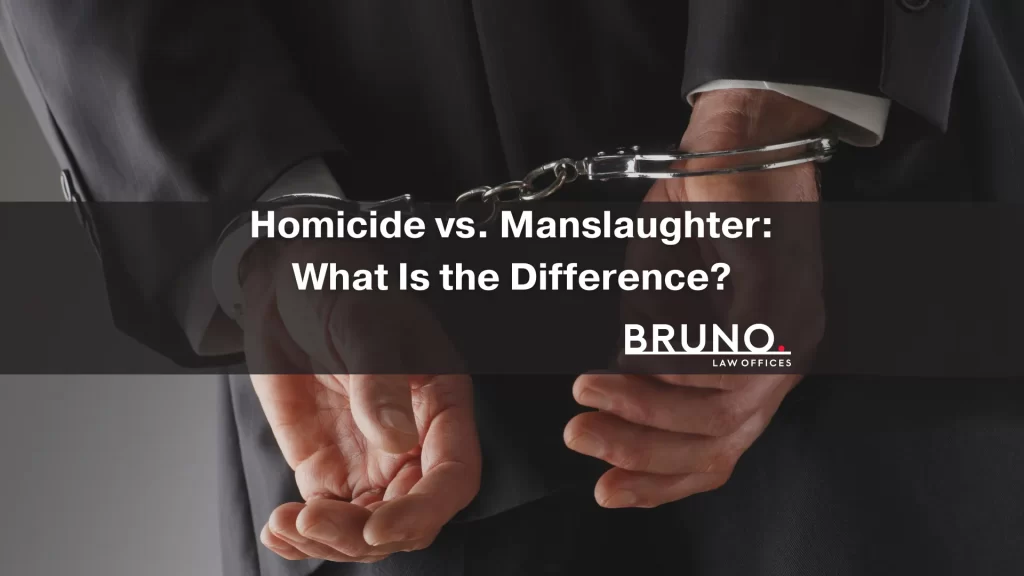Posted on Wednesday, November 1st, 2023 at 9:00 am
Criminal charges stemming from the death of another individual are among the most significant in the American criminal justice system. However, understanding the different charges related to the unlawful death of another person can be challenging. There are specific legal distinctions between murder and manslaughter. The legal differences can significantly affect the penalties you may face for a conviction and the type of defense your attorney mounts on your behalf.
At Bruno Law Offices, our experienced criminal defense team wants to help you understand the difference between homicide and manslaughter and what those differences may mean to you.
What Is the Difference Between Homicide and Manslaughter?
There are significant legal distinctions between homicide and manslaughter in Illinois. Homicide is the unlawful and intentional killing of another individual. However, manslaughter occurs when someone’s lawful or unlawful actions unintentionally cause another person’s death. On paper, the differences may seem slight. Yet, in the Illinois court of law, the subtle difference can make a significant difference in the potential penalties a person may face if convicted of causing the death of another person.
To further complicate the situation, homicide and manslaughter are terms that both encompass multiple degrees of severity. In homicide cases, an individual can potentially face first-degree or second-degree murder charges.
First-degree murder involves:
- The intent to kill or cause grave bodily injury to another person, knowing those injuries can cause death.
- Killing another person during the commission of a forcible felony
Second-degree murder involves:
- The intent to kill or cause grave bodily injury under a sudden and intense passion or due to significant provocation.
- Killing an individual while believing that the killing would be lawfully justifiable, but the belief is unreasonable.
Manslaughter charges are also divided into separate categories. In Illinois, the state only recognizes voluntary manslaughter as the killing of an unborn child.
Voluntary manslaughter includes:
- An individual acting under sudden and intense passion or significant provocation whose negligent actions accidentally cause the death of an unborn child.
- An individual killing an unborn child believes that the killing would be lawfully justifiable, but the belief is unreasonable.
Involuntary manslaughter occurs when:
- An individual unintentionally kills another person without lawful justification.
- Acts perpetrated by an individual, lawful or unlawful, that are likely to cause death or grave bodily harm to another.
Reckless homicide is often lumped together with manslaughter. An individual can face reckless homicide charges when a motor vehicle collision causes an unintentional death.
Examples of Homicide
Murder tends to be a more straightforward legal concept. When a person intentionally sets out to kill another person or cause them grievous bodily harm capable of leading to death, they can face murder charges. Those convicted of first-degree murder can face 20 years to life in prison. Second-degree murder convictions can lead to a prison sentence of between four and 30 years. Individuals can also face significant fines and other personal and professional consequences.
Examples of Manslaughter
Manslaughter charges are not always as easy to comprehend as murder charges. Again, you may not intentionally set out to kill someone when you leave for work in the morning. Still, if you engage in reckless behavior behind the wheel that causes an accident and someone’s death, you can face reckless homicide charges.
An individual may think “pranking” their friend by pushing them off a cliff into a famous watering hole is funny. However, if that friend dies as a result, that may be an example of involuntary manslaughter. The individual did not intend to kill their friend, yet their reckless actions caused a death, nonetheless.
Defending Yourself Against Criminal Charges
Defending yourself against significant criminal charges stemming from the death of another person first means understanding the charges against you. If you are charged with homicide or manslaughter, exercise your right to remain silent. Never talk to law enforcement without first requesting legal representation. You cannot talk your way out of this type of situation. Let an attorney do the talking for you.
Next, an experienced criminal defense attorney can review the unique circumstances of your situation and strategically design a defense plan that aligns with the facts in your case. At Bruno Law Offices, we don’t believe in taking a one-size-fits-all approach to address significant criminal charges. We’ll carefully review the evidence and craft a tactical plan while protecting your legal rights.
Contact Our Illinois Criminal Defense Office Today
Don’t try to defend yourself. Trust the Champaign-Urbana criminal defense team at Bruno Law Offices, backed by over 35 years of legal experience. We provide proactive and personalized legal representation to the clients we serve. Contact us online or call our office today at (217) 328-6000 and arrange for a confidential legal consultation.

